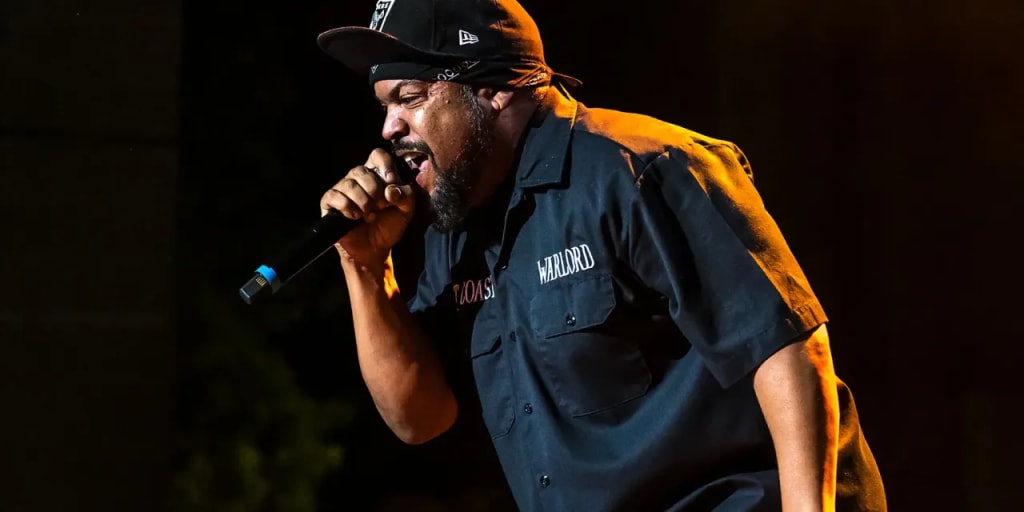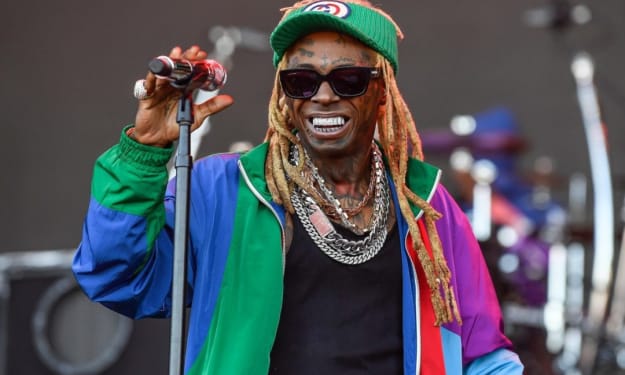Ice Cube: The Life and Legacy of a Hip-Hop Pioneer
by David Pieringer

Ice Cube: The Life and Legacy of a Hip-Hop Pioneer
Ice Cube, born O'Shea Jackson on June 15, 1969, in Los Angeles, California, is a multifaceted artist who has significantly impacted the worlds of hip-hop, film, and social activism. Known for his provocative lyrics, commanding presence, and entrepreneurial spirit, Ice Cube has shaped the cultural landscape over the past three decades. This article explores Ice Cube’s early life, rise to fame, musical evolution, business ventures, personal life, and lasting legacy.
Early Life and Influences
O'Shea Jackson grew up in South Central Los Angeles, a neighborhood characterized by gang violence, poverty, and racial tensions. His parents, Doris and Hosea Jackson, instilled in him the values of hard work and resilience. Despite the challenges of his environment, Ice Cube excelled academically and developed an interest in writing, particularly poetry, which laid the foundation for his future in rap.
In high school, Ice Cube formed the group C.I.A. (Cru' in Action!) with his friend Sir Jinx. They performed at parties hosted by Dr. Dre, who was then a member of the World Class Wreckin' Cru. Ice Cube's talent quickly caught Dre's attention, leading to the formation of the pioneering gangsta rap group N.W.A. (Niggaz Wit Attitudes) in 1986, alongside Dre, Eazy-E, DJ Yella, and MC Ren.
Rise to Fame with N.W.A.
N.W.A.'s debut studio album, "Straight Outta Compton" (1988), revolutionized the music industry with its raw depiction of life in South Central Los Angeles and its unapologetic critique of systemic racism and police brutality. Ice Cube's powerful and provocative lyrics on tracks like "Straight Outta Compton" and "F**k tha Police" established him as the group's primary lyricist and a fearless voice of the streets.
The success of "Straight Outta Compton" catapulted N.W.A. to national prominence, but internal conflicts and financial disputes led Ice Cube to leave the group in 1989. His departure marked the beginning of a prolific solo career that would further solidify his influence in hip-hop.
Solo Career and Musical Evolution
Ice Cube's solo debut, "AmeriKKKa's Most Wanted" (1990), produced by the Bomb Squad, was a critical and commercial success. The album's hard-hitting beats and incendiary lyrics addressed themes of racial injustice, urban strife, and social upheaval. Tracks like "The Nigga Ya Love to Hate" and "Endangered Species (Tales from the Darkside)" showcased Ice Cube's unflinching social commentary and lyrical prowess.
In 1991, Ice Cube released "Death Certificate," a concept album that delved deeper into social and political issues. The album, divided into "The Death Side" and "The Life Side," featured tracks like "No Vaseline," a scathing diss track aimed at his former N.W.A. bandmates, and "Black Korea," which addressed racial tensions between African Americans and Korean shop owners. "Death Certificate" was both controversial and influential, cementing Ice Cube's reputation as a fearless provocateur.
Throughout the 1990s, Ice Cube continued to release successful albums, including "The Predator" (1992), "Lethal Injection" (1993), and "War & Peace Vol. 1 (The War Disc)" (1998). His music evolved to incorporate a broader range of styles, from hardcore rap to G-funk, while maintaining his commitment to social and political commentary.
Transition to Film and Acting Career
Ice Cube's transition to film began with his acting debut in John Singleton's "Boyz n the Hood" (1991), where he played the character Doughboy. The film was a critical and commercial success, and Ice Cube's performance received widespread acclaim. This marked the beginning of a successful acting career that would see him star in, produce, and write numerous films.
In 1995, Ice Cube co-wrote and starred in the cult classic comedy "Friday," alongside Chris Tucker. The film's success led to two sequels, "Next Friday" (2000) and "Friday After Next" (2002), and established Ice Cube as a versatile actor and screenwriter. His other notable film credits include "Barbershop" (2002) and its sequels, "Are We There Yet?" (2005), "21 Jump Street" (2012), and "Straight Outta Compton" (2015), which he produced and which chronicled the rise of N.W.A.
Business Ventures and Entrepreneurship
Ice Cube's entrepreneurial spirit extends beyond music and film. He has ventured into various business endeavors, including sports, fashion, and media. His diverse portfolio reflects his ability to innovate and influence multiple industries.
In 2017, Ice Cube co-founded the BIG3 basketball league, a professional 3-on-3 league featuring former NBA players. The league has grown in popularity and demonstrated Ice Cube's ability to create successful ventures outside of entertainment.
Ice Cube also launched his clothing line, Solo by Cube, which offers a range of streetwear and casual apparel. The brand reflects his unique style and has resonated with fans and fashion enthusiasts alike.
Personal Life and Challenges
Ice Cube's personal life has been marked by stability and dedication to his family. He has been married to Kimberly Woodruff since 1992, and together they have five children. His son, O'Shea Jackson Jr., portrayed him in the biographical film "Straight Outta Compton," highlighting the strong bond between father and son.
Despite his success, Ice Cube has faced controversies and challenges, particularly regarding his outspoken views on social and political issues. His willingness to address controversial topics has sometimes sparked backlash, but it has also cemented his reputation as a fearless and influential figure.
Philanthropy and Social Impact
Ice Cube's commitment to philanthropy and social impact is evident through his various charitable efforts and initiatives. He has been actively involved in supporting education, community development, and social justice causes.
Ice Cube has used his platform to advocate for change and raise awareness about issues affecting marginalized communities. His music, films, and public statements often address systemic racism, economic inequality, and the need for social reform. His dedication to these causes reflects his belief in using his influence to make a positive impact on society.
Legacy and Influence
Ice Cube's legacy is defined by his contributions to hip-hop, film, and social activism. As a rapper, he has consistently pushed the boundaries of the genre, creating music that resonates with diverse audiences and influences future generations. His ability to blend raw storytelling with powerful social commentary has set new standards for lyrical excellence.
Ice Cube's influence extends beyond music, as he has played a significant role in shaping the cultural landscape. His contributions to film, entrepreneurship, and social advocacy demonstrate his versatility and forward-thinking approach. Ice Cube's impact on hip-hop and culture continues to inspire and influence future generations of artists and creators.
Cultural Impact
Ice Cube's cultural impact is vast and enduring. He has shaped the sound and direction of hip-hop, influenced film and television, and set new standards for social and political commentary. His ability to tackle controversial topics and push boundaries has solidified his place as a trailblazer in the entertainment industry.
Ice Cube's influence can be seen in the work of contemporary artists, who draw inspiration from his music and approach to storytelling. His albums, particularly "AmeriKKKa's Most Wanted" and "Death Certificate," continue to be studied and celebrated for their artistic and cultural significance. Ice Cube's ability to connect with listeners and viewers on a deep, emotional level has ensured his enduring relevance and impact.
Conclusion
Ice Cube's journey from the streets of South Central Los Angeles to becoming a hip-hop pioneer and cultural icon is a testament to his talent, resilience, and vision. His contributions to music, film, and social justice have left an indelible mark on the world. As an artist, entrepreneur, and activist, Ice Cube continues to inspire and influence future generations.
His legacy is one of innovation, empowerment, and transformation. Ice Cube's ability to navigate the complexities of life and career while remaining true to his roots has ensured his enduring relevance and success. As he continues to evolve and explore new opportunities, Ice Cube's impact on music, culture, and society will undoubtedly continue to grow, cementing his place as one of the most influential figures of our time.
About the Creator
David Pieringer
Welcome to my page! I'm a dedicated writer and student with a passion for both education and sports. Balancing my love for learning with my athletic pursuits, I strive to excel in everything I do.
Enjoyed the story? Support the Creator.
Subscribe for free to receive all their stories in your feed. You could also pledge your support or give them a one-off tip, letting them know you appreciate their work.






Comments
There are no comments for this story
Be the first to respond and start the conversation.